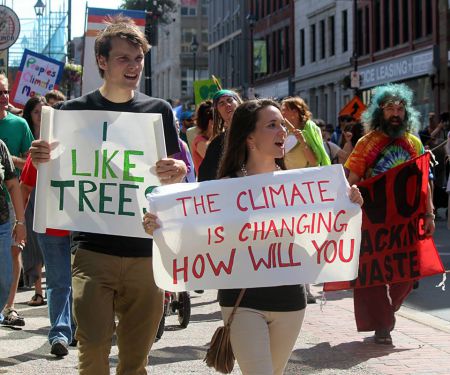Saddle up people, because best case scenario, it’s going to be a rough ride.
The fracking debate in Atlantic Canada is only now beginning to settle down, with Nova Scotia banning the practice and New Brunswick’s provincial government promising to follow suit, but let’s rewind a few months to when it was the subject on everyone’s minds. Why didn’t we want fracking?
The answer most often given was water security. Yes, hydraulic fracturing would seriously damage groundwater and make sick the people who depend on it, but there’s a much more serious issue raised by fracking which, for some reason, didn’t carry much weight. Even the panel of experts, hired by Nova Scotia’s provincial government to review the impacts of fracking, didn’t discuss it.
The issue I’m referring to is climate change.
A few weeks ago the Energy East oil pipeline was formally proposed by TransCanada. If built, it will carry 1.1 million barrels of Alberta’s crude oil to Atlantic Canada for refinement and overseas shipping, allowing the Canadian Tar Sands to expand an estimated 40 per cent. The Tar Sands already accounted for 6.8 percent of Canada’s greenhouse gas emissions in 2010.
Of course there’s a powerful resistance building to Energy East, but if asked, what are folks most afraid of? Oil spills, in any of the countless communities, streams and forests this pipeline will be cutting through to make its cross-Canada journey. Taking a back seat in the debate, yet again, is climate change.
Whether we’re talking about oil and gas development in the Gulf of St Lawrence, on the Scotian Shelf, on Anticosti Island or the Grand Banks of Newfoundland, climate change is always the most muted argument. Why are oil spills more provocative than the end of the world?
This isn’t to say climate change isn’t on environmentalists' minds. Too often, however, this argument is dismissed out of hand, as though climate change is more a slogan than a reality, a mere talking point, not the greatest threat humanity has ever faced, an ideological goal, not a global necessity. There’s an unspoken agreement in this country that we’ve given up on combating climate change…and it needs to stop.
Two weeks ago, the Intergovernmental Panel on Climate Change, which has in its ranks hundreds of the world’s leading scientists, economists, engineers, social scientists and even philosophers, released their fifth and most frightening report to date.
These, the smartest people on Earth, have declared the next ten years to be the most important in human history.
Without immediate and decisive action on a global scale to reduce CO2 emissions, we’ll be faced with vanishing coastlines, loss of water and food security, storms and intense rainfalls and droughts and heat waves unlike anything we’ve ever seen. Prince Edward Island will become the Prince Edward Islands, if not vanish from our maps altogether.
The report says we need to reduce carbon emissions by 40-70 per cent by 2050 and in fact be in the negatives by 2100, by way of reforestation or carbon capture. It says 35 per cent of global CO2 emissions are coming from the energy sector, the largest single contributor. It says 90 per cent of our planet’s warming thus far has taken place in the oceans, devastating marine ecosystems. It says if we want to avoid two degrees Celsius of global warming, the point of no return, then we have a lot of work to do this decade.
We’ve known the urgency for a while now. What we may not have known is how important a role Atlantic Canada can play in saving the world. Oil and gas development is descending on Eastern Canada like a hydrocarbon hungry demon. We’re the next fossil fuel frontier of this nation, a nation which has fallen short of every carbon commitment it’s ever made…a nation among the largest polluters on Earth.
Fracking has lost ground in Nova Scotia and New Brunswick, but it’s being proposed for Anticosti Island in the Gulf of St. Lawrence. Offshore drilling on the Grand Banks of Newfoundland is looking to expand dramatically and we will see drilling on Nova Scotia’s east coast as early as next summer. There will be a test well drilled in the Gulf of St Lawrence by 2016 if that project gets the green light and of course there’s Energy East, delivering Alberta’s tar to the St Lawrence Estuary and the Bay of Fundy. The threat these projects pose to our climate is impossible to quantify.
Too often our political and industrial representatives get away with saying, “we will develop our oil and gas resources in a sustainable and environmentally responsible manner,” a statement so far outside reality I’m left with one of two conclusions. Either we are being deliberately misled, or more frightening, our leaders feel comfortable omitting climate change from statements like this.
Climate change is an immediate and enormous threat to Canadian and global prosperity…and more than most nations on Earth, we are in a position to do something about it.
Every litre of oil removed from the ground is the proceeds of an environmental crime…and every litre left untouched is a blessing. If the political will doesn’t exist to halt oil and gas development in Atlantic Canada, the public will must.
Climate change should be the trump card against all oil and gas development in this region, not the elephant in the room.



